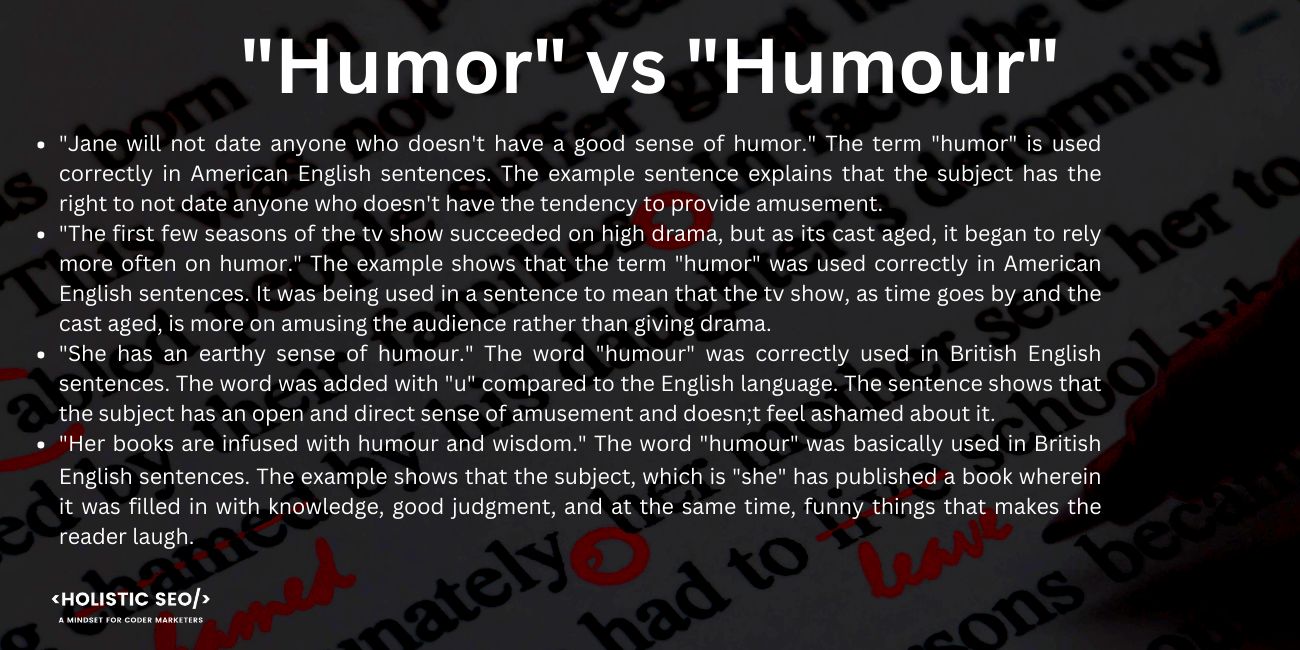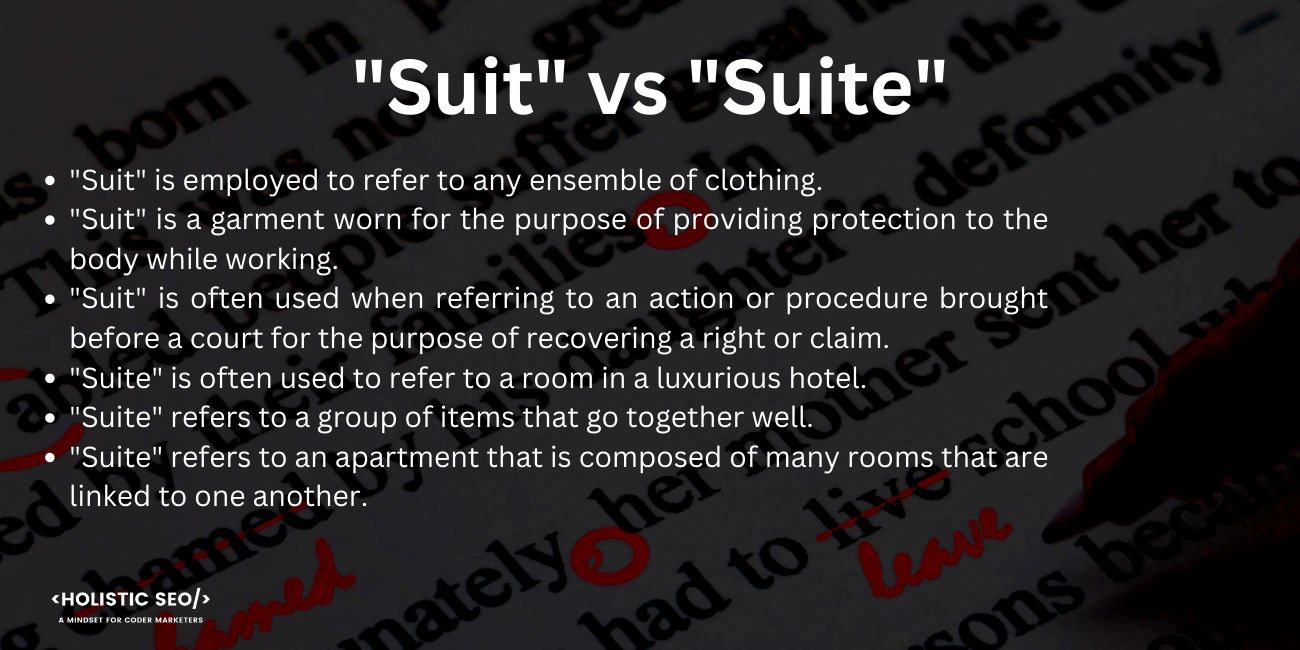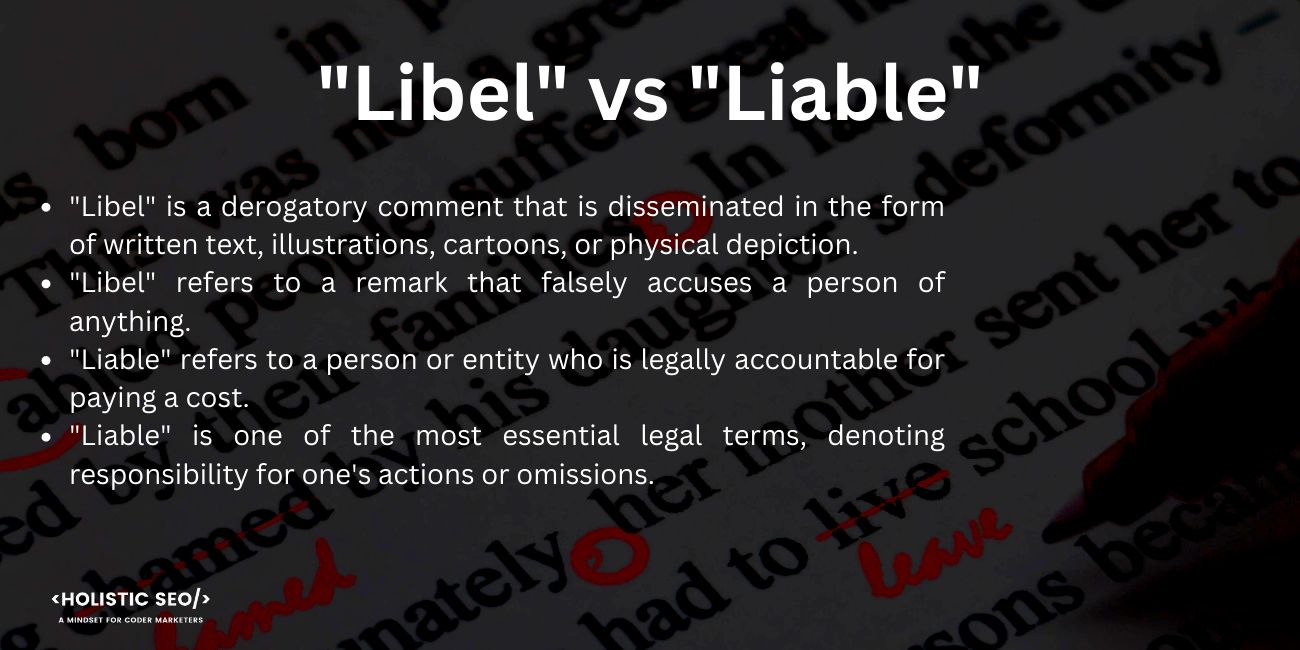Humor is spelled either “humor” or “humour,” although they both refer to the same thing. “Humour” is the word of choice in British English, whereas “Humor” is the word of choice in all of the other primary variations of English. The distinction even applies to the derived participles, which are referred to as “humored” and “humoured” respectively. On the other hand, the letter “u” is never spoken in the second syllable of the word “humorous” in any form of the English language. Content writers have the option of using any of these terms, depending on what they are writing about. The distinction between these words is based on the spelling patterns used in two different cultures that use English as their primary language.
Listed below are some example sentences using the word “humor.”
- “Jane will not date anyone who doesn’t have a good sense of humor.” The term “humor” is used correctly in American English sentences. The example sentence explains that the subject has the right to not date anyone who doesn’t have the tendency to provide amusement.
- “The first few seasons of the tv show succeeded on high drama, but as its cast aged, it began to rely more often on humor.” The example shows that the term “humor” was used correctly in American English sentences. It was being used in a sentence to mean that the tv show, as time goes by and the cast aged, is more on amusing the audience rather than giving drama.
Listed below are some example sentences using the word “humour.”
- “She has an earthy sense of humour.” The word “humour” was correctly used in British English sentences. The word was added with “u” compared to the English language. The sentence shows that the subject has an open and direct sense of amusement and doesn;t feel ashamed about it.
- “Her books are infused with humour and wisdom.” The word “humour” was basically used in British English sentences. The example shows that the subject, which is “she” has published a book wherein it was filled in with knowledge, good judgment, and at the same time, funny things that makes the reader laugh.
What is the Difference between “Humor” and “Humour”?
The distinction between the words “humor” and “humour” shifts slightly depending on the speaker’s regional accent. The concept of “humor” is often utilized in the English spoken in the United States. The term “humour,” on the other hand, is utilized far more frequently in the British English language and in other types of the English language. The writers of the content are able to distinguish between them based on their spelling. The word “humor” only has one occurrence of the letter “u,” but the word “humour” has two occurrences of the letter. However, when it comes to their meaning, the words “humor” and “humour” are interchangeable and refer to the same concept.
Do “Humor” and “Humour” mean the same thing?
Yes, both words “humor” and “humour” refer to the same concept, so yes, they are interchangeable. It refers to the capacity to laugh at something, the manner in which individuals recognize that some things are humorous, as well as the property of being humorous. The difference between “humor” and “humour” is simply due to the speaker’s choice of dialect. The term “humor” is used more frequently in American English than in British English. On the other hand, the word “humour” is frequently utilized in the British language as well as in other forms of the English language.
How to Spell “Humor” and “Humour”?
Some people have difficulty spelling the terms “humor” and “humour,” which are two spelling variants of the same word. In British English, the word “humour” is spelt with a “u”. The letter “u” comes after the letter “o” in the correct spelling. On the other hand, “humor” is how Americans spell it when they speak American English. The letter “u” is not included in the word’s spelling. However, due to spelling discrepancies, the words “humor” and “humour” are pronounced slightly differently. The word “humor” is pronounced “HYOO+MUH” when split down into its component sounds. Meanwhile, the word “funny” is articulated as “HYOO+MR” and its component sounds are separated.
How to Use “Humor” in American English?
The correct spelling of the word “humor” is without the letter “u” since this is how American English learners spell it. It is a noun derived from the Old North French “humour,” the Old French “umor,” and the Modern French “humeur,” all of which imply “to grow moist.” It was used for the first time throughout the middle of the 14th century. “humor” is a common word that is frequently used in conversation. It became a widely used term for describing the property of being humorous or funny.
Listed below are the example sentences of using the term “humor” in American English.
- “His sense of humor wasn’t well understood by many.”
- “Everyone in the audience laughed a lot when the speaker delivered the humor in his speech.”
- “He showed flashes of humor that delighted the audience.”
- “She has a good sense of humor.”
How to Use “Humour” in British English?
The correct form of use for the term “humour” is to spell it with the letter “u” and is placed after the letter “o” since it is how the British English learner spell it. The term “humour” shares the same origin with the American spelling “humour.” It is a noun word which was derived from Old North French “humour,” Old French “umor,” and “Modern French “humeur,” meaning to become wet. Its first known use was during the middle the 14th century. The term “humour” is a daily life word and is often used in a conversation. It became an important word for everyone to mean a word for the quality of being funny.
Listed below are the example sentences of using the term “humour” in British English.
- “He was a nice man with a great sense of humour.”
- “There was good chemistry but I don’t like it because he has no sense of humour.”
- “Amazingly efficient, great charm and sense of humour, unique.”
- “She had the most incredible sense of humour and could destroy me with laughter.”
What are the Common Phrase Combinations of “Humor” and “Humour”?
Listed below are the common phrase combinations of “humor” and “humour.”
| English Word | Definition | Phrase Combination | Example Sentences of Phrase Combination |
| Humor | “Humor” means the quality of being amusing or comic, especially as expressed in literature or speech. | “Sense of humor” “Dark humor” | “Having a good sense of humor is a great stress buster.” “The movie does have violence, some played as dark humor.“ |
| Humour | “Humour” is the quality of something that makes someone laugh. | “Good humour” “Out of humour” | “We appreciate his good humour.“ “As usual, when out of humour, he was determined to move the house.” |
The table demonstrates that the terms “humor” and “humour” have the same meaning. The spelling of words simply varies depending on the dialect utilized. The term “humor” is used only in American English, whereas “humour” is used exclusively in British English and other English dialects. Using these terms interchangeably likely result in the loss of readers’ confidence. The correct use of “humor” and “humour” will vary depending on the target audience of the text.
What are the Example Uses of “Humor” in American Publications?
Listed below are the example uses of “Humor” in American Publications.
- “This is not to say the first-rate humor can’t be squeezed out of the spy game. By the Washington Post” The example sentence shows that the term “humor” is used correctly. The term “humor” in a sentence shows that it was being used to mean as a quality of something funny that someone is not able to grip out of.
- “But the level of humor – much of it distinctly of the bathroom variety- is aimed squarely at the under-13 set. By USA Today” The term “humor” is being used correctly in American English sentences. The word “humor” was scaled and is being used in a sentence to mean the ability of something to cause something funny.
What are the Example Uses of “Humour” in British Publications?
Listed below are the example uses of “Humour” in British Publications.
- “John Cleese has said that the James Bond film series has dispensed with its humour, in order to pander to Asian audiences. By The Guardian” The word “humour” was correctly used in British English language. It was being used in a sentence to explain that the movie James Bond still manages to distribute humour to the audience.
- “With Ross’s keen editorial observations, his self-deprecating humour and his supporting characters, Eyes is a welcome addition to my shelves of newspaper noir. By Calgary Herald.” The sentence structure used “humour” in a sentence correctly. It was being used to mean that someone’s scrutiny of someone’s work made the subject welcomed to the newspaper company.
How to Use “Humor” or “Humour” for Content Marketing?
The usage of “humor” and “humour” in content marketing is dependent on the target demographic. Content writers have options about the spelling of terms. The term “humor” must only be spelled for an American English audience, as it is their chosen language. In the meanwhile, the term “humor” must only be used in British English, as this is the chosen spelling for their language. Using these correctly spelled terms in content marketing results in a higher ranking and a larger audience than using them poorly. Furthermore, employing the proper phrases and comprehending the audience reveals unfulfilled demands. The approach enables a a business or brand to better tailor its product or service offering and sales strategy to the needs of its target market.
How does Accent Differences Affect Search Engine Optimization?
Accents matter and have a substantial influence on search marketing results in languages other than English. The search results for all accents imply, but do not prove, that the algorithm interprets them differently. However, the ranks are likely to change, but there is some overlap, with the top positions fluctuating less than the lower entries on the first page. Therefore, the algorithm certainly treats various spellings differently. It only indicates that prospects exist and have an impact on multiregional SEO recommendations for smart marketers. International SEO professionals frequently discuss the significance of “accents” for search engine algorithms. Accents are markings that appear above, below, or between existing characters in a text in the target language. Additionally, having an accent is essential when producing content for search engine optimization (SEO). Therefore, utilizing accents for different sorts of audiences is advantageous for search engine optimization (SEO) rankings globally.
What are the Similar Accent Differences such as “Humor and Humour”?
Listed below are the similar accent differences such as “humor” and “humour.”
- “Defence” and “Defense”: The words “defence” and “defense” are words that are often misinterpreted akin to “humor” and “humour.” The terms “defence” and “defense” are similar sounding despite coming from different accents. The spelling of “defence” and “defense” are distinguished by the usage of the letters “c” and “s.” However, they pertain to the same thing, which is protection or protecting something from danger.
- “Savour” and “Savor”: The terms “savour” and “savor” are similar accent differences to “humor” and “humour” in English. “Savour” comes from the British accent, while “savor” belongs to the American accent which affects their pronunciation slightly. Furthermore, the spelling is altered due to an additional letter “u” to “savour” in comparison to “savor.” On the contrary, the meaning they deliver is the same and that is “enjoying food or an experience slowly.”
- “Odour” and “Odor”: “Odor” and “odour” are English words that are frequently confused because of accent separation. “Odor” and “odour” are pronounced with minimal differences. Moreover, the word construction is changed because of an additional “u” in the word “odour,” whereas “odor” omits it. The definition of both “odor” and “odour” is unpleasant smell.
- “Demeanour” and “Demeanor”: The terms words “demeanour” and “demeanor” are alike to “humour” and “humor.” The words “demeanour,” “demeanor,” “colour,” and “color” are distinguished on which dialect they come from through their pronunciation. Similarly to “colour” and “color” there is an extra letter “u” in “demeanour” and “demeanor.” However, the meaning does not change because the words “demeanour” and “demeanor” refer to someone’s outward behavior and appearance.
- 48 Online Shopping and Consumer Behavior Statistics, Facts and Trends - August 22, 2023
- B2B Marketing Statistics - August 22, 2023
- 38 Podcast Statistics, Facts, and Trends - August 22, 2023


